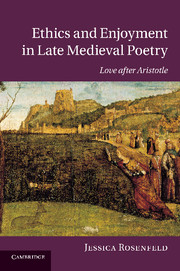Book contents
- Frontmatter
- Contents
- Acknowledgments
- Introduction: love after Aristotle
- 1 Enjoyment: a medieval history
- 2 Narcissus after Aristotle: love and ethics in Le Roman de la Rose
- 3 Metamorphoses of pleasure in the fourteenth-century dit amoureux
- 4 Love's knowledge: fabliau, allegory, and fourteenth-century anti-intellectualism
- 5 On human happiness: Dante, Chaucer, and the felicity of friendship
- Coda: Chaucer's philosophical women
- Notes
- Bibliography
- Index
- CAMBRIDGE STUDIES IN MEDIEVAL LITERATURE
Coda: Chaucer's philosophical women
Published online by Cambridge University Press: 04 February 2011
- Frontmatter
- Contents
- Acknowledgments
- Introduction: love after Aristotle
- 1 Enjoyment: a medieval history
- 2 Narcissus after Aristotle: love and ethics in Le Roman de la Rose
- 3 Metamorphoses of pleasure in the fourteenth-century dit amoureux
- 4 Love's knowledge: fabliau, allegory, and fourteenth-century anti-intellectualism
- 5 On human happiness: Dante, Chaucer, and the felicity of friendship
- Coda: Chaucer's philosophical women
- Notes
- Bibliography
- Index
- CAMBRIDGE STUDIES IN MEDIEVAL LITERATURE
Summary
Female characters such as Alcyone and Criseyde often make the strongest cases in Chaucer's poetry for an ethical relationship to love, embodying what I have called “erotic Aristotelianism.” The course this book has traced from Pygmalion to Criseyde begins to map a complicated terrain that features the gendering of the subjects of ethical love, one in which feminine characters are often the ones who take up the role of the amorous philosophical subject. We might not be surprised by this, given Jane Burns' observation that women in Old French literature create possibilities for a larger range of desiring experiences – beyond the paradigm of unrequited male desire – and disrupt the binary structure of the conventional Western romantic love story. Both Burns and Simon Gaunt have argued that feminine and queer subjects in medieval romance trouble dominant modes of desire, sublimation, and sacrifice, and thus offer ways of critiquing the ethics of courtly love from within; as Burns puts it, we can productively look back to those medieval heroines “who broke the rules but still stayed in the game.” These women break the “rules” by neither remaining silent objects of desire nor inhabiting the subject position of masculine desire for such a silent object. I would argue that in the wake of the reception of Aristotelian ethics, such possibilities expand, and, as we have seen in the figures of Pygmalion, Pynoteüs, Alcyone, the Black Knight, and Criseyde, the subject of courtly Aristotelianism expresses desire for shared fortune, for a lover who speaks, for an “alikeness” that does not reduce the beloved to a mirror image.
- Type
- Chapter
- Information
- Ethics and Enjoyment in Late Medieval PoetryLove after Aristotle, pp. 160 - 170Publisher: Cambridge University PressPrint publication year: 2010



